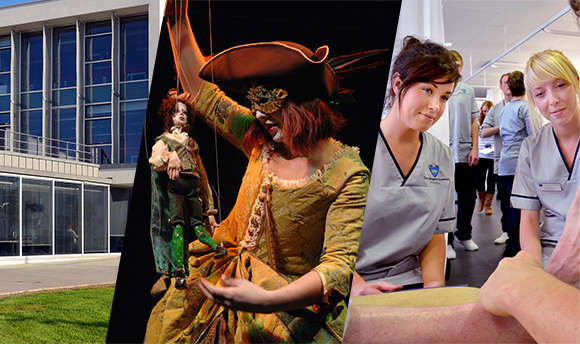Promoting Dignity in Work and Study Policy
We strive to promote equality of opportunity for all, value difference and create a working, learning and social environment in which the rights and dignity of all our staff and students are both considered and respected.
| Document type | Policy |
|---|---|
| Scope | Staff and Students |
| Applicability date | August 2024 |
| Review date | August 2027 |
| Approved by | SLT |
| Date of approval | 2023 |
| Equality impact assessment |
| Version number | Changes / updates | Document status | Changes approved by | Date |
|---|---|---|---|---|
| 1.1 | New policy | Published | SLT | 2023 |
1.1 Introduction:
At Queen Margaret University, (QMU) we are proud of our overall aims to Shape a Better World through Education, Research and Innovation. In doing so, we also aim to enable individuals and communities to flourish. We consciously dedicate ourselves to subjects that represent a distinctive people focus - for example, healthcare, social sciences, creative arts, business management and enterprise.
QMU are pioneers in inclusiveness and embrace people from all backgrounds, cultures and locations.
1.2 What does promoting Dignity in Work & Study mean in QMU?
Our definition is very simple. QMU values individuals (staff and students) for who they are and what they bring to QMU. We want you to be yourself, bring yourself to QMU and be part of making a positive difference in the University.
Actually promoting Dignity in Work and Study is sometimes less simple and requires us all to periodically take time to consider our own approaches, language and behaviour and how we may be impacting on others.
At QMU, we recognise that the profiles and expectations of people are constantly changing. Our approaches must also continually evolve to mirror modern society in both work and learning.
1.3 Aims of this Policy:
This policy aims to clarify:
- Why promoting Dignity in Work and Study is important in QMU and what we expect from all students and staff in this area
- How to recognise where people are promoting Dignity in Work & Study
- What we expect you to do if you believe this is not being promoted
1.4 Why is promoting Dignity in Work & Study Important to QMU?
We want everyone who chooses be part of QMU, to subscribe to our six core values, which are:
- Valuing individuals and encouraging collective support
- Valuing social justice
- Valuing excellence
- Valuing intellectual curiosity
- Valuing ambition
- Valuing environmental sustainability
At least five of our six values link directly to this policy.
1.5 Why is Dignity in Work & Study Important to our People?
We know that when a thriving working environment exists in QMU that is free from any form of inappropriate / unacceptable behaviour which excludes or marginalises others, on balance, people are more likely to:
- Present themselves and be themselves at work and study
- Feel emotionally well
- Feel included, enthused and motivated to do a good job (Staff)
- Contribute towards making a positive difference to the University
- Work / study in a friendly and collegial manner
- Be more likely to complete their programme and remain with us (Students)
Promoting dignity in work and study is therefore important to everyone who is part of QMU.
2.0 Key Terms and Themes to Consider
2.1 Our Definition of Dignity in Work and Study:
QMU is wholeheartedly committed to fostering an inclusive culture which is free from discrimination, harassment and bullying. We strive to promote equality of opportunity for all, value difference and create a working, learning and social environment in which the rights and dignity of all our staff and students are both considered and respected.
2.2 Discrimination – The Legal Definition:
By contrast, Discrimination occurs where we treat someone unfairly or less favourably (not as well) as we would treat others on the grounds of a ‘Protected Characteristic’. The ‘characteristics’ that are protected under the law (the Equality Act 2010) are:
- Sex (This relates to a person’s birth Sex and applies to both men and women)
- Race (All ethnicities, nationalities and citizenships – minority and majority)
- Disability (Certain physical, sensory, medical and neurodiverse conditions)
- Age (People of all ages)
- Religion / Belief (This includes established religions e.g. Christianity, Muslim, Sikh, Judaism, Hinduism and Buddhism and also, certain other philosophical belief systems, e.g. Veganism and Atheism)
- Sexual Orientation (e.g. people who are heterosexual, a-sexual, gay, or bi-sexual)
- Pregnancy and Maternity
- Marriage and Civil Partnerships
- Gender Reassignment. (People who are proposing to change, are changing, or have changed their Gender to be different from that of their birth Sex)
Source: ACAS
2.3 Discrimination - Additional QMU Commitments:
At QMU we recognise and respect the following additional personal characteristics and circumstances. Whilst not currently enshrined in Equality legislation, we want this policy to also apply in respect of your own:
- Caring Responsibilities e.g. people who care for children, vulnerable adults and dependants
- Contractual status and role e.g. manager, cleaner, lecturer student, casual, annualised, contract and fixed term working.
- Trade Union (TU) membership* or engagement in TU activities, membership, non-membership or intention to join / leave a trade union.
- Gender Identity. (Not the same as either Transgender or Birth Sex. We respect that some people may self identify as:
- A gender that is opposite to their birth gender.
- More than one gender.
- No gender.
As a QMU employee, you have specific legal rights in respect of Trade Union membership. As a QMU student, you can access the Students' Union.
2.4 Harassment - The Legal Definition:
Harassment occurs where behaviour, language or actions - whether intended or not, create an intimidating, hostile, degrading, humiliating or offensive environment for a person.
Source: ACAS
2.5 Bullying - A Definition:
Although there is no legal definition of bullying, it can be described as unwanted behaviour, from a person or a group, that is either:
- Offensive, intimidating, malicious or insulting.
- An abuse or misuse of power that undermines, humiliates, or causes physical or emotional harm to someone.
The bullying might also:
- Be a regular pattern of behaviour or a one-off incident.
- Happen face-to-face, on social media, in emails or telephone calls.
- Occur in class or in other work-related situations and may not always be obvious to, or noticed by, others.
- Happen from students to students, colleagues towards others, from a manager to a staff member, a student to a member of staff or a member of staff to a manager (The last two examples can be called 'upward bullying'.)
It's possible someone might not know their behaviour is bullying. It can still be bullying even if they do not realise it or do not intend to bully someone.
Source: ACAS
2.6 Definition of Inclusion:
Inclusion is defined as: Having a sense of belonging, feeling respected, valued for who you are and experiencing a level of supportive energy and commitment from others so that you can do your best.
Source: Miller and Katz, 2023
Promoting Dignity in Work and Study requires everyone to strive and work towards an environment that is inclusive and free from discrimination, harassment and bullying.
3.0 Examples of behaviours that could have a negative impact on the dignity of others:
Whilst it is practically impossible to list every eventuality, the following are examples of behaviour, language or conduct that QMU could regard as being a violation of our Dignity in Work and Study policy:
- Use of language - spoken, written or digital, which could reasonably be perceived by the recipient as being racist, homophobic, biphobic, (against people who are bisexual) transphobic, ageist or sexist
- Intentional and repeated use of a name or pronoun that is not welcomed by the recipient. (Particularly when this has been highlighted by the person concerned.) For example, referring to a student who identifies as male by a female name or pronoun
- Deliberately ignoring someone or excluding them from conversations, activities or meetings. This includes deliberately excluding the contributions of students in a learning environment
- Unnecessary communication and escalation of matters to others in the University including the use of the c.c. or b.c.c. functions in email
- Unwanted physical contact or ‘horseplay’ including touching, pinching, pushing or brushing past someone
- Unwelcomed sexual advances or suggestive language / behaviours used towards QMU staff by other QMU staff members or students
- Any sexual advances, suggestive language or behaviours used by QMU staff towards QMU students
- Inappropriate language or behaviours used by QMU students towards staff including, for example, comments posted about staff in chat forums
- Making derogatory or stereotypical remarks (spoken or digital) about a particular protected characteristic (see page 4) whether the person they are directed at has the protected characteristic in question or not
- Threats relating to job security, progression, exam grades and ongoing employment
- Inappropriate or derogatory comments –about a person’s appearance
- (e.g. size and weight) including remarks which may be explained by the perpetrator as humour or banter, but not excused by the recipient
- Excessive and unnecessary out of hours contact via telephone, e-mail, text or social media
- Displaying or circulating (print or digital) of material that could reasonably be regarded by QMU as inappropriate, offensive or discriminatory. This includes circulating links to online resources / materials
- Unreasonably and unilaterally dismissing requests for adjustments to working arrangements - for example, to accommodate a disability or family friendly working arrangements
- Invasion of physical space. Shouting at colleagues or students
- Public ridicule, sarcasm or comments that humiliate others
- Abuse of power, position and knowledge including excessive supervision, setting of impossible deadlines, removal of key areas of responsibility
- Copying or taking the credit for the work of others.
- Intrusive comments or questions about a person’s private life. (Staff and Students)
- Use of unwanted name calling and nick names
- Spreading of malicious rumours – verbally or digitally
- Making malicious or unfounded accusations of bullying, harassment or discrimination where it is reasonable to conclude that the behaviour, language or actions in question were not and were actually a deliberate exaggeration aimed at causing harm or distress to an individual
- Posting pictures or messages on social media outlets, for example, Facebook, Twitter, TikTok and Instagram, that could reasonably be expected to cause distress to others
- Creating a fake social media account and pretending to be someone else in order to post unwanted or offensive content
4.0 Scope of this Policy:
4.1 Who does this Policy Apply to?
This policy applies to all QMU students and employees - fixed term or permanent including contractors. It relates to all interactions with others both inside and outside of what may be regarded as normal working hours.
The policy may also apply in respect of certain social events – particularly (but not exclusively) when the events have been organised by QMU or are predominantly attended by people who are connected with the University.
4.2 Who is responsible for ensuring this Policy is promoted?
We want everyone who is part of QMU to uphold the principles of this policy and either intervene / question or report behaviours language or actions that are perceived to be unacceptable. The University reserves the right to take appropriate action (including disciplinary measures for University staff) against anyone where it can be reasonably proven that this policy has been violated.
4.3 Legitimate Leadership, Management and Ongoing Feedback:
As an academic and educational institution, we strive for continuing improvement in both work and learning. As such, our staff are required to give guidance and instructions to our students and our managers are required to make reasonable requests of staff members.
General objections in respect of instructions given by staff / managers to others does not constitute an automatic violation of this policy.
We also expect all our staff, where it is part of their role, to provide ongoing, reasonable and constructive feedback to others – including to their line manager, colleagues and students. Non acceptance / disagreement with such feedback by the recipient, is also not considered by QMU to be an automatic violation of this policy.
Finally, legitimate performance management instigated by QMU managers following legitimate QMU procedures will not generally be regarded as a breach of this policy.
4.4 Freedom of Speech and Academic Freedom:
Freedom of speech must be exercised within the University within the parameters of this policy. For example, vigorous academic debate should be conducted respectfully and must not compromise the dignity of others.
Also, and in accordance with the HE Governance Act 2016, QMU is committed to upholding the academic freedoms of staff, within the law, to:
- Hold and express opinions
- Question and test established ideas or received wisdom
- Develop and advance new ideas or innovative proposals
- Present controversial or unpopular points of view
Please note that the above ‘freedoms’ should never be used to legitimise the expression of negative opinions relating to the characteristics of an individual, or groups of individuals (staff or students) within QMU.
5.0 Getting it Right
The following list of top tips may go a long way to ensuring we are all promoting Dignity in Work and Study in QMU.
- Remember that ‘little things’ are important! Some of the smallest (micro behaviours) can have a massive impact on an individual’s emotional wellbeing.
- Take time to ask people if they are OK. They may generally appreciate your interest!
- Pick up on inappropriate behaviour that is going on around you. If you are thinking “I wouldn’t like that” the chances are the person receiving it may not ‘like it’ either.
- Challenge others, politely and informally. Using the phrase “I do not feel comfortable with that language or behaviour” is always a very good start!
- Much diversity of people is invisible. For example, many disabilities are not immediately obvious. It’s often very difficult to guess (for example) a person’s sexuality, religion or gender identity.
- Remember that many people have long term partners or immediate family members with ‘Protected Characteristics’. For example, a person may have a disabled wife, a partner who is minority ethnicity, a relative who is transgender etc. Inappropriate comments at work affect people very differently and may constitute what is known as Associative Discrimination.
- Many people who behave inappropriately at work may claim that it is simply banter or a joke. This may explain but can never excuse conduct that causes harm to others.
- Use of inclusive language is a significant consideration in promoting workplace dignity. A word that can seemingly cause little offence to one person, may be regarded as hugely offensive by another. If you are in any doubt about the suitability of your language, some of the contacts listed in the signposting page of this policy may be able to help you further.
Finally, please remember that promoting Equality of Opportunity (same chance) requires us all to do slightly different things to meet the slightly different needs of people. One size will never fit all!
6.0 Reporting Procedures and Signposts:
If you do witness or experience in QMU, behaviours, language or actions that you believe represent a breach of this policy, there are many options available to you. These are shown here (In no particular order)
- Speak to your tutor or manager - Where the complaint does not relate to your tutor or manager.
- Speak to the person directly - Tell the person what is happening, how you feel and what you may or may not do if the conduct continues.
- Speak to your Union - TU representatives generally understand this subject well
- Speak to Human Resources - This department also understand this subject well
- Obtain External Advice:
- ACAS Helpline - 0300 123 1100
- Employee Counselling Service – MCL Medics (Pass: QUEENMGU_2023 - Activation code: 612961)
- Report an incident via Report and Support (Staff and Students)
- Raise a Grievance (Staff)
6.1 Other Related QMU Policies:
The following QMU policies/resources are related to this document and may provide useful further reading:
Human Resources Enquiries
The recruitment process is managed by the QMU HR team.
For any recruitment and selection process enquiries, please contact us.
Show Contacts


